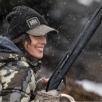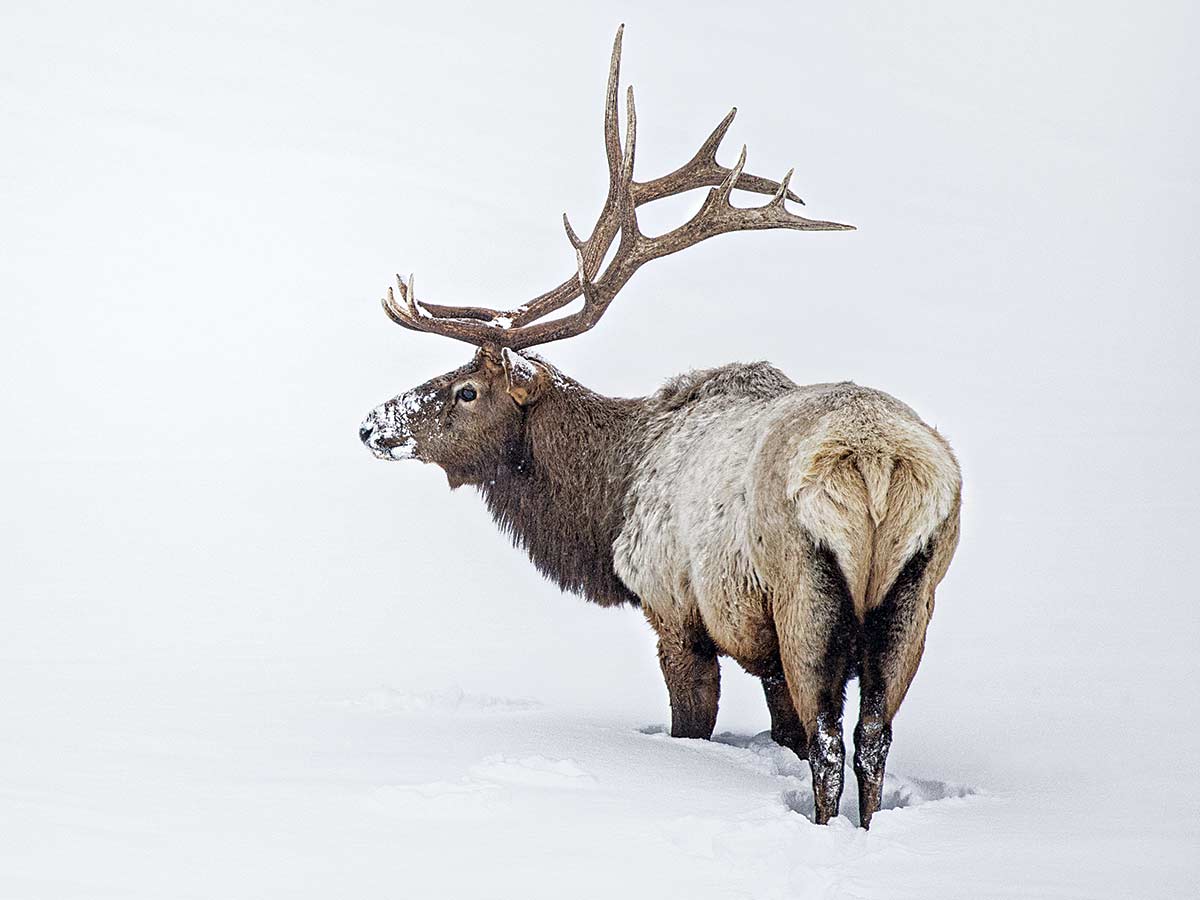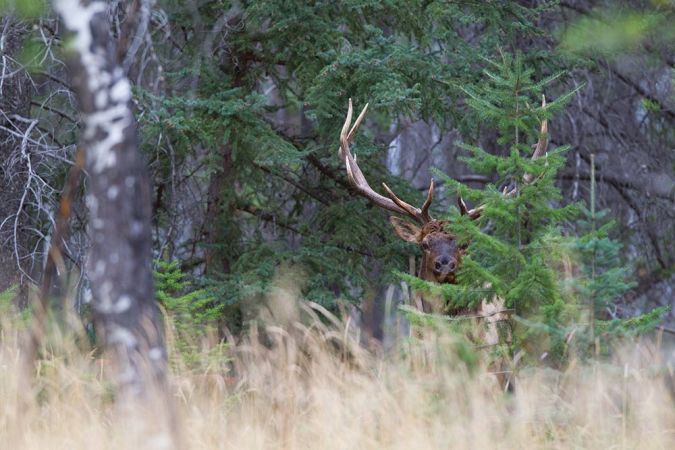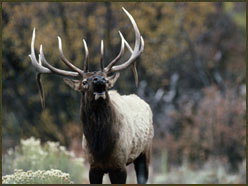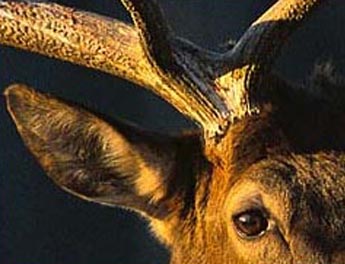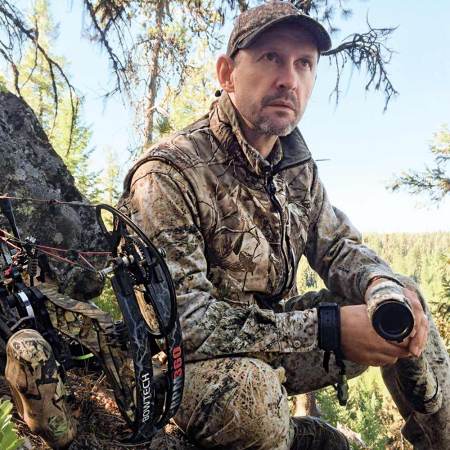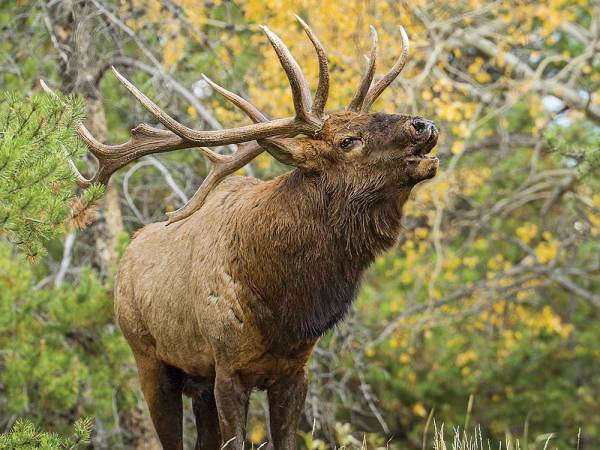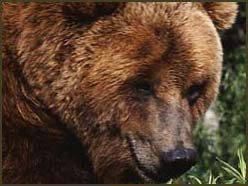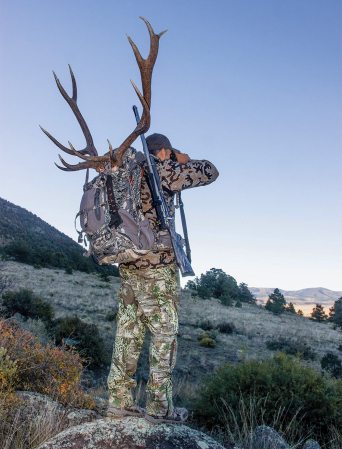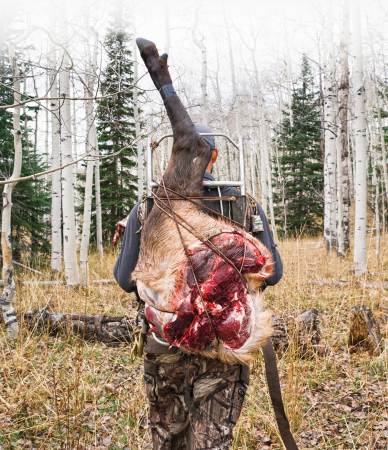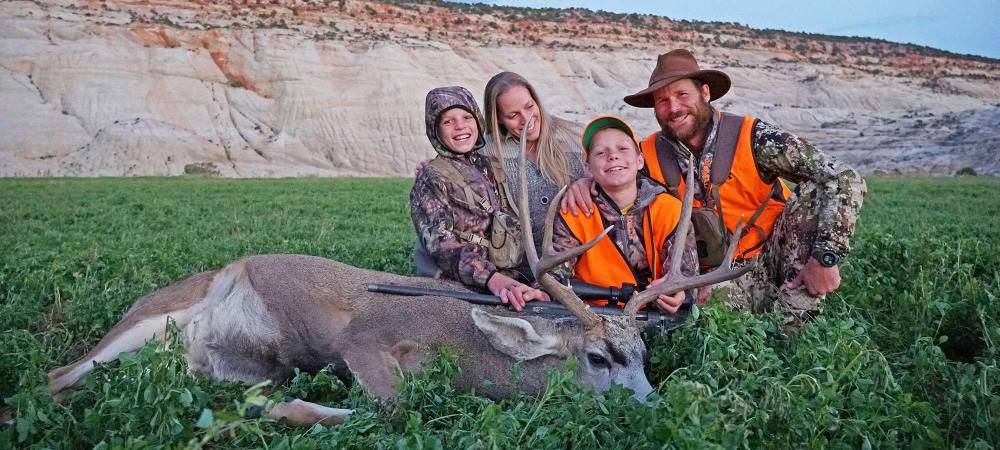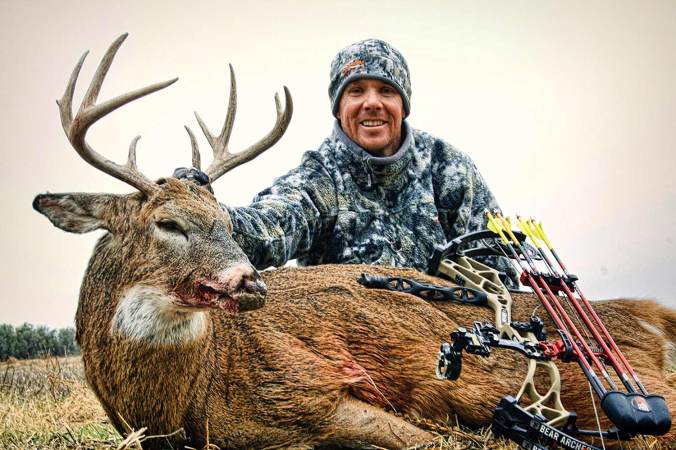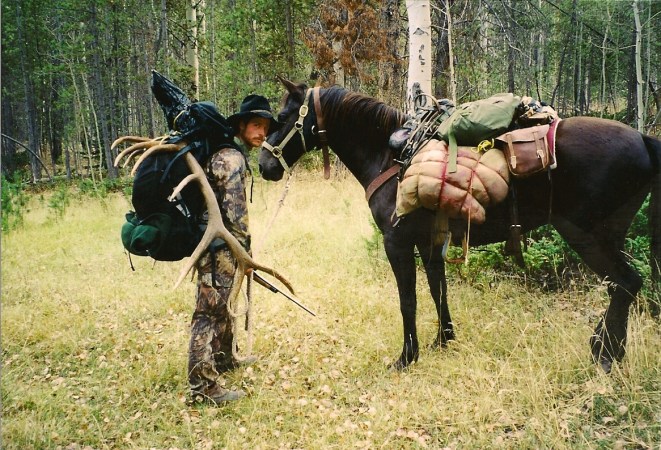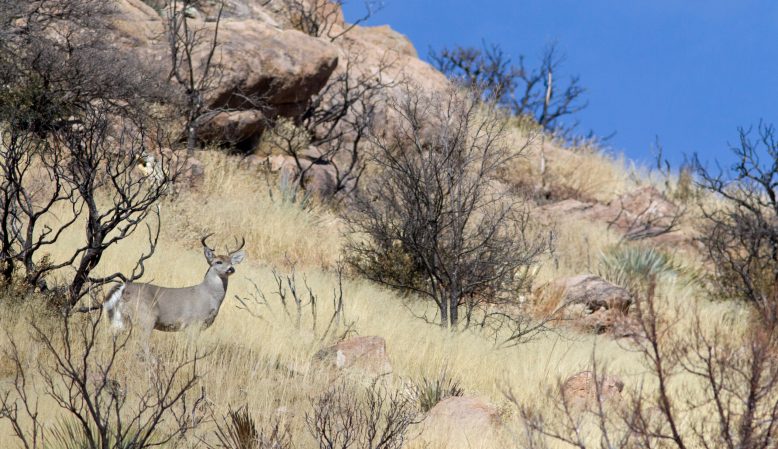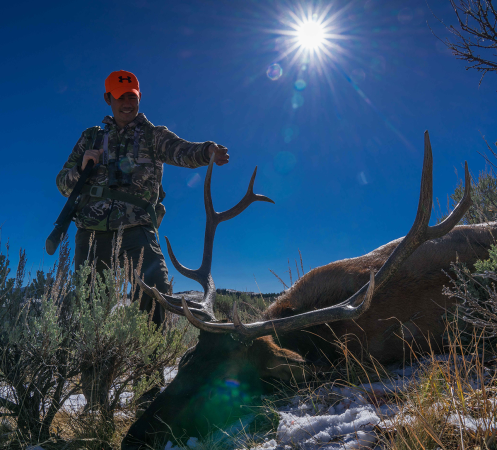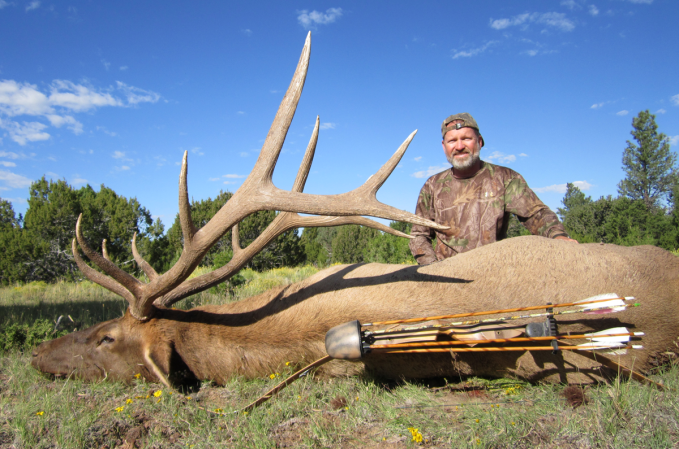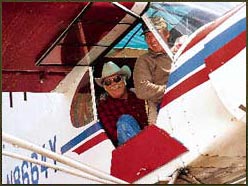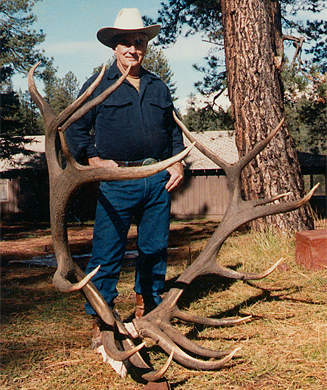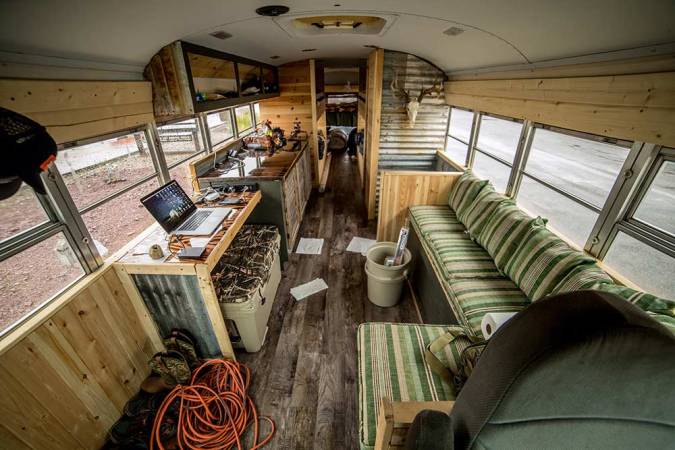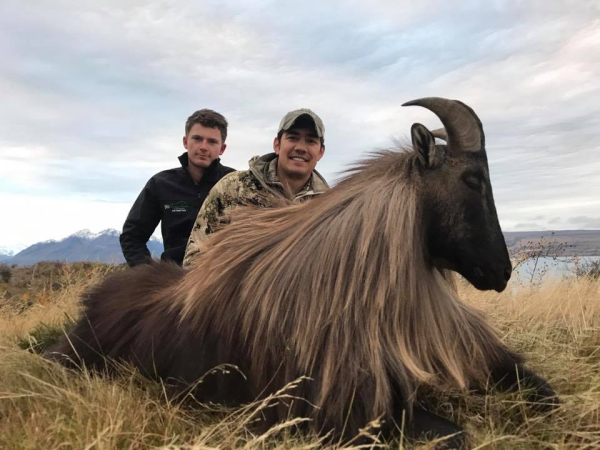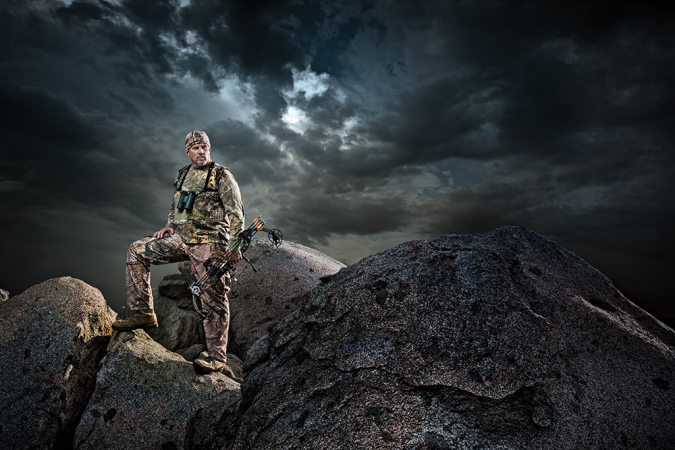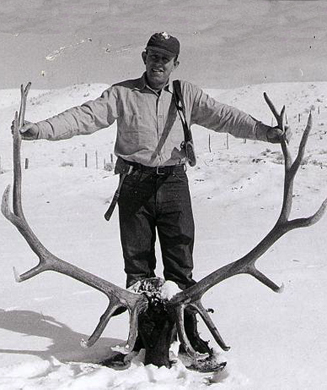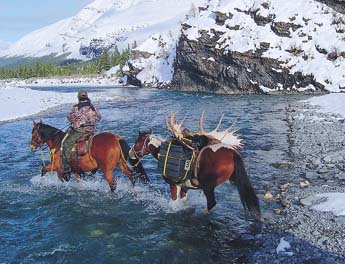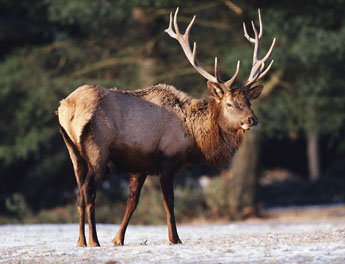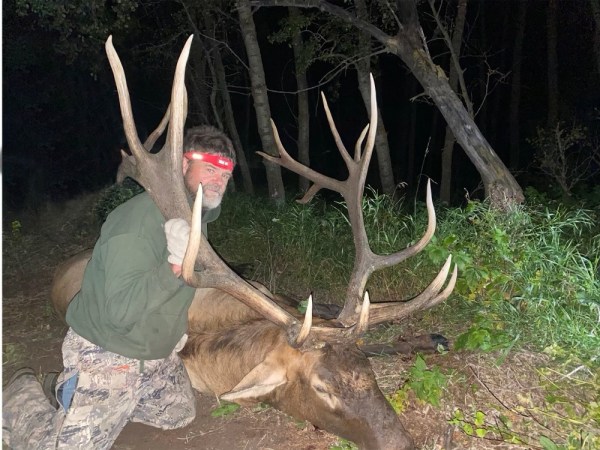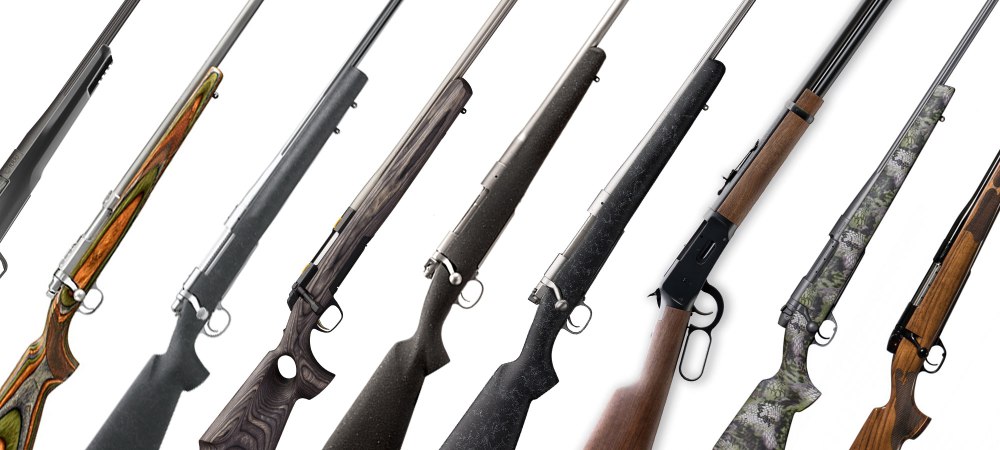The bugle surprises both of us.
It’s the second one we’ve heard from the bull—the first sounded far away among the falling snow and muffling pines. But he’s close now. We look at each other, then Aram looks around our narrow meadow.
“We should sit down,” he says. There’s a rise of timber behind us, and we tuck into it, sitting side by side and propping our rifles on our packs. We’re aiming across 60 yards of meadow at a treeline. Aram cow-calls. This time, the bull cuts him off.
“He’s coming,” Aram says, bending to his scope.
For a full minute we strain our ears and hear nothing but settling snowflakes. Then branches begin to snap as the bull closes the distance, shouldering his way through the pines. I see a flash of tawny hide, and dark forelegs. There’s one tree left between us when I glimpse his antlers. He’s a good bull. I already know the answer, but I ask Aram anyway.
“Do you want him?”
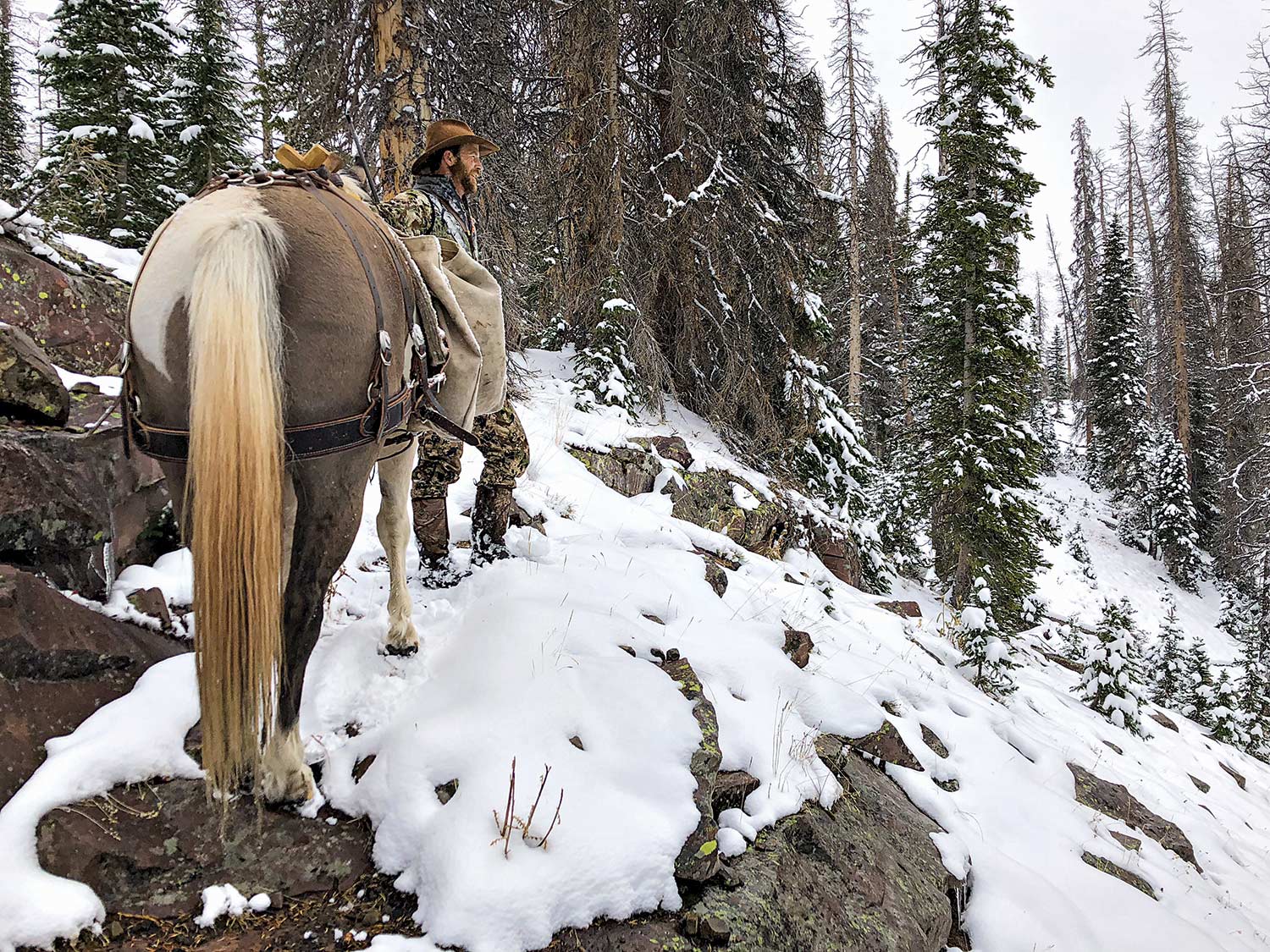
“Into the Wild” by Natalie Krebs
Two days before Utah’s general elk season opened, I met Aram at the trailhead. It’s a place he told me about—one I can’t tell anyone else about. He had trailered six horses from his home in Boulder, Utah, plus most of camp, and brought all the intel and expertise we would need to try to fill three over-the-counter bull tags in one week.
His buddy Serge Karanov would be hunting with us, albeit packing in alone. Serge is a big man. None of Aram’s horses could carry his enormous frame all 13 miles up the mountain, so he planned to hike partway. An affable restaurateur and Soviet defector, Serge served homemade borscht at the trailhead and had packed enough food to last until the spring thaw.
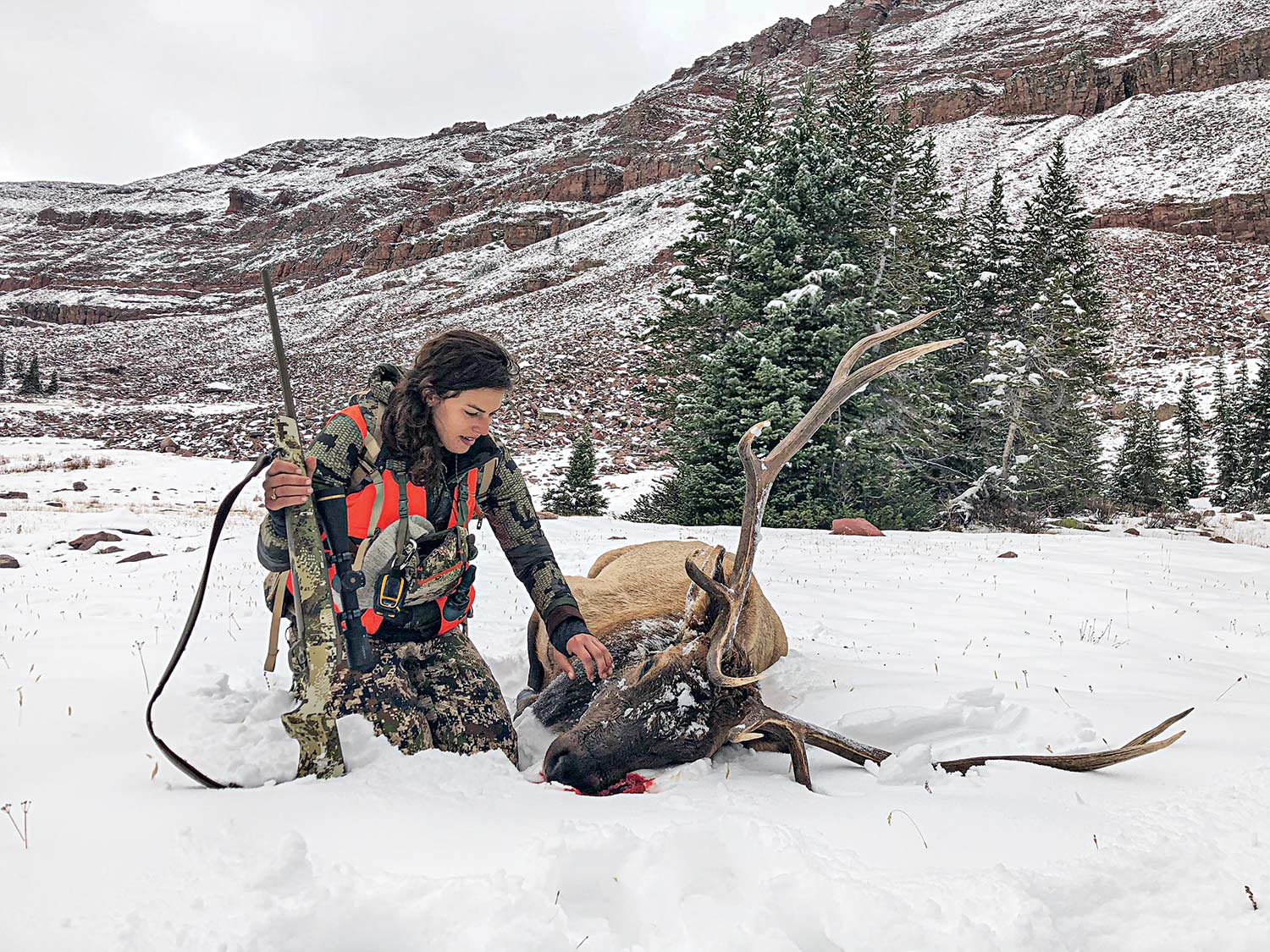
After enduring a rainy night under a tarp, Serge set off while Aram and I set to work sorting gear and loading horses in the parking lot. I was clumsy with the tack, and it was late morning by the time we got on the trail, which wound from sodden, aspen-covered valleys to steep canyons and scraggly pines. Halfway up we collected Serge, who had been enjoying the view and a cigarette. We crossed the snow line next, where the rain had turned to flurries. Aram was like a horse smelling the barn: The closer we got to camp, the more eager he became to start hunting.
When the trail ended in a peak-rimmed basin at 11,000 feet, Aram found his old campsite easily. It had been three years since he’d hunted here, though, and in the intervening seasons, pine beetles had killed the trees beside it. We settled on a new site near a lake full of hungry trout, hobbled the horses, and hurried to make camp in time to scout for the next day’s opener. At dusk, we heard a cow chirping in a nearby meadow and returned to our tent at dark, the temperature in the teens. As we ate rehydrated stroganoff in our sleeping bags, Aram walked us through the week ahead. The hunting would be tough and shot opportunities fleeting. He advised us to shoot any bull we saw, even if it was a spike. We would likely get only one shot, if that.
“My only request,” he added, “is that if we get on a bull, I would like the first right of refusal.”
At first, this struck me as selfish. No hunting partner had ever asked me this before, nor been so direct about wanting priority. I’d been on elk hunts, but I had never held a tag myself. Serge had killed only one, a spike. Aram, meanwhile, had killed many elk, including a bull that scored more than 400 inches. But the request made sense too. Serge and I were relying on Aram for everything. His horses had carried us up the mountain, he was the only one who could call worth a damn, and he knew where the elk were. And, after all, this was his spot. His request was a small thing to trade for all that.
We both agreed, of course, and turned in. As we lay in our sleeping bags, fighting the altitude for sleep, the high-pitched scream of a bull cut the silence.
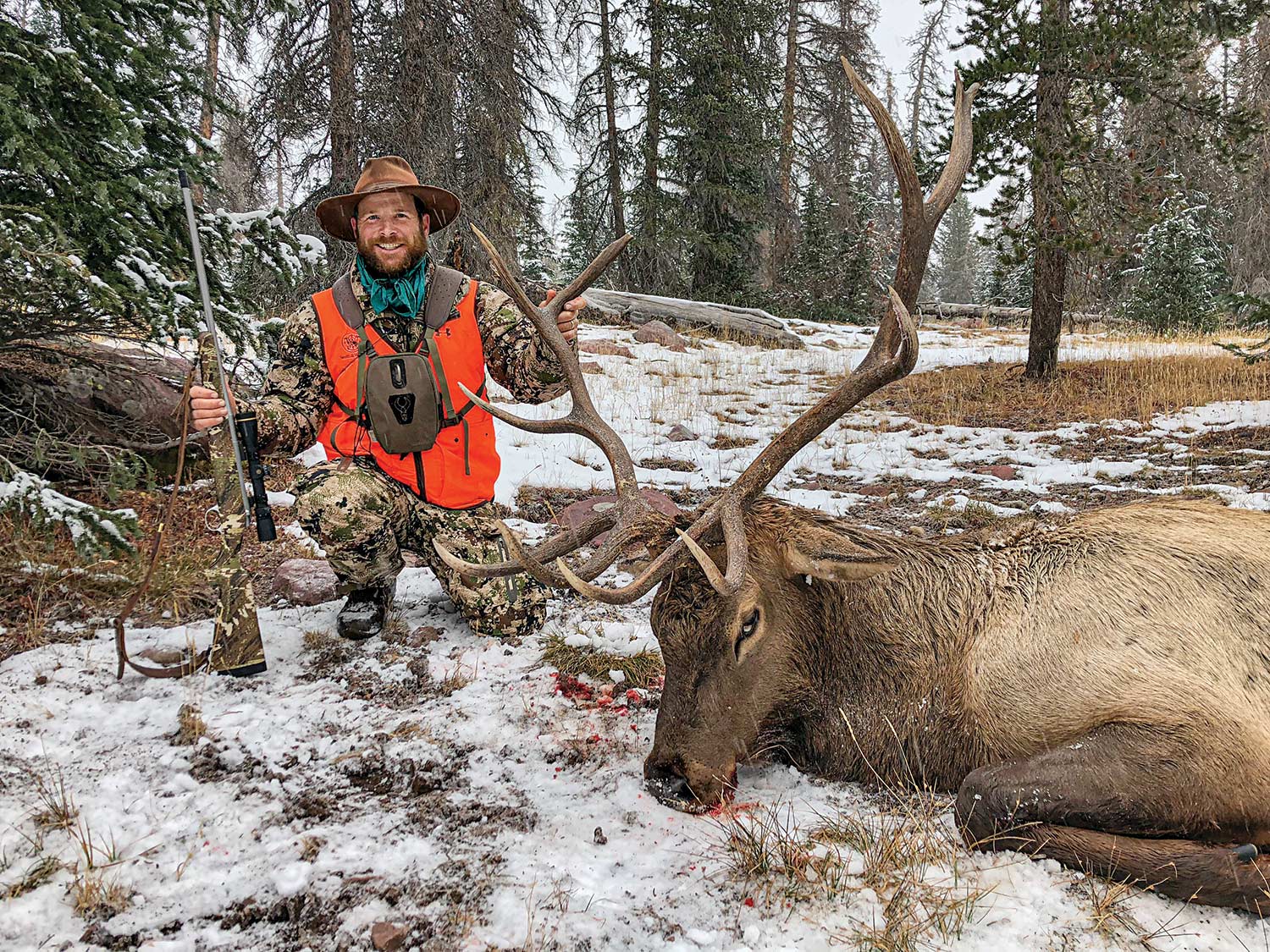
“This Land Is My Land” by Aram von Benedikt
I sat my horse 11,000 feet above sea level in Utah’s wilderness, surrounded by stunted black timber. A gigantic canyon opened before me like the maw of a monster; the wind shrieked in my ears. But in the distance above, a high-country basin shone emerald, interlaced with meandering creeks and ponds. Now that, I thought to myself, looks like elk country.
It would be 12 years before I worked deep enough into that rugged hellhole to find out if my hunch was correct. My home state is a hard place to kill a bull in any general unit, let alone a branch-antlered bull with a bit of size to him. Hunter success with a rifle hovers around 9 percent, and good hunting areas are guarded like the Holy Grail. I ranged far and wide for a few years, finding a few elk here and there but never seeing a good bull, let alone killing one.
Then one day I received a phone call from an old mountain man. He was known for taking big wilderness bulls, and he invited me to hunt with him—on the condition that I would never divulge the whereabouts of his territory, nor return without his permission. I agreed and found myself on one of the coldest hunts I’ve ever experienced. Alone and half frozen, I killed a giant 6×6 bull miles from the nearest road.
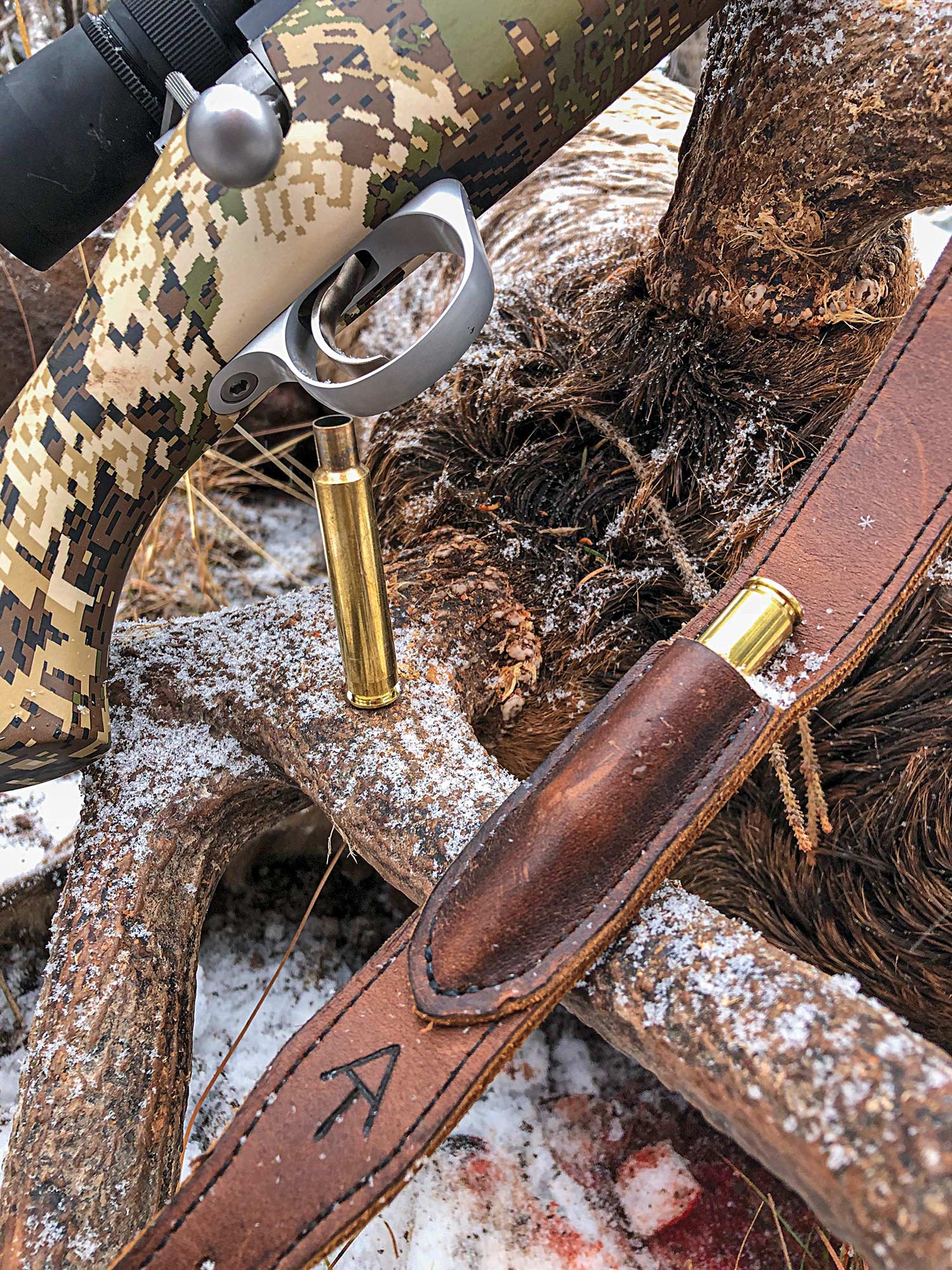
“Good,” the mountain man said. “Now you know what to look for. Go find your own hunting grounds.”
It took several more years of searching, but along the way I harvested a few elk and saw beautiful country. Finally, I loaded my panniers, shoved my rifle into its scabbard, and pointed my horses up the long trail toward that emerald basin I’d seen years before. Bulls bugled, my meat pole sagged from the weight of elk quarters, and I never saw another hunter nor heard another’s shot. I’d found my own honey hole.
Now, “sacred” may be too strong a word, especially for public land where every license-holder has a right to hunt. But battles have been fought and wars waged over hunting grounds across the contested trails of history, and I can understand why. If I found another hunter stalking elk in my spot, no, I wouldn’t shove a stone knife through his belly. In fact, I’d respect him for getting back here. But neither would I tell him where the elk like to feed, which cliffside bench they travel, nor where their favorite wallows lie. That knowledge belongs to me. I earned it through the miles I’ve ridden, the elk trails I’ve discovered, and the frozen nights I’ve camped in the snow.
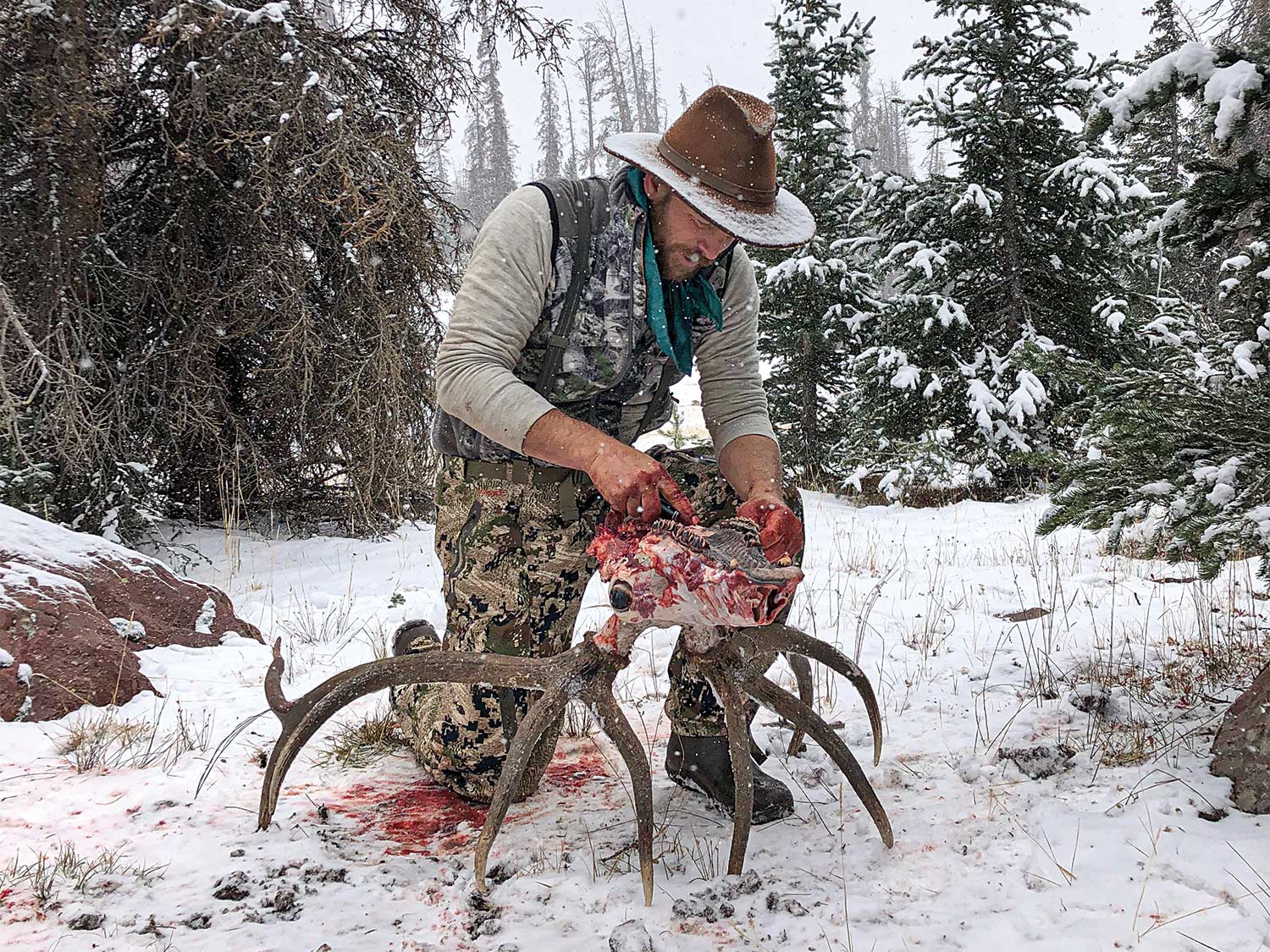
“First Blood” by Natalie Krebs
The heavy flakes that had covered our tent in the night blocked the dawn of opening day, and when Aram pokes his head out, he gives a little yelp.
“We’re late,” he whispers. “Hurry up.”
Serge and I tug on our frozen boots and hustle after Aram toward the meadow. We pile into a tree well at the top of a rise, and Aram hits his cow call. Serge and I are still getting settled when a lone cow walks into range. She searches for the cow she heard, then wanders away. Once she is gone, Aram looks at us reproachfully.
“If that had been a bull,” he says, “neither of you would’ve been ready.”
I wonder if he’s regretting having invited us. Then a thin bugle sounds in the distance and decides our morning. Serge will ease through the timber south of camp. Aram and I will go after the bugle. Sooner than we expect, the bull is busting through the trees toward us.
“Do you want him?” I ask, and Aram is already saying, “I’ll take him.”
And he does. I watch through my scope as the bull absorbs Aram’s bullet square in the front of his chest, rearing like a bronco and tumbling backward. The moment the bull is still, Aram’s focus melts into euphoria. His face splits into a wide smile.
“You know,” he says, getting to his feet, “I think that’s the first bull I’ve ever called in and killed. I’ve called plenty for other hunters, but never for myself.”
If I wasn’t already glad Aram had taken the shot, I certainly am now. I’d contributed nothing to this hunt so far besides company, and Aram had earned his elk in every way. The bull is a handsome 5×6, and we set to quartering him. It feels as if we have all the time in the world: It’s barely an hour into opening day, and there’s already an elk on the ground. I fillet meat from the neck as Aram skins the skull, the brim of his hat gathering snow. As we work, we talk of everything, and nothing at all.
“Double Down” by Aram von Benedikt
After we pack my bull back to camp and finish our chores, I consider our options for the afternoon. Serge was disappointed to have missed the morning’s fun, and so he, Natalie, and I shoulder our packs and slog through the still-falling snow. Our destination is a big cliff-top bench where I had killed a bull years before; it’s also a good spot to glass for elk in the basin below. We pause at a lake to cow-call, and keep moving when there’s no response. But 500 yards beyond it, Serge realizes he left his phone by the shore. Not wanting to derail our plan, he tells me and Natalie to go ahead as he hunts his way back.
It’s growing late as the two of us clamber up a steep boulder field. The snow has stopped, and Natalie wears an unabashed grin as we scramble the last few yards. I’m impressed. I never would have invited her if I didn’t think she could handle the hardship of this hunt, but I’m still pleased to be proven right.
My thoughts turn back to the task at hand when I step off the last boulder and onto fresh elk tracks. Snow had fallen less than an hour ago, and this spoor is on top of it. A cow, it looks like, and a bull. No—two bulls. I wave Natalie into step behind me, and we follow their trail. The tracks weave across the bench and through broken clumps of high-elevation evergreens. The cover thins as we work toward the basin rim, a sheer wall of mountain stretching skyward. These prints can be only minutes old and are growing fresher with every step.
“Get ready,” I say softly. “This could happen fast.”
Natalie nods, eyes bright, her rifle in hand. I wonder if she knows how incredible this is, to have found another bull in this wilderness. We’ve just begun crossing a meadow when it happens. I have my binocular pressed to my eyes, scanning our left side.
“There, right there!” Natalie whispers, pointing to 12 o’clock. “There’s a bull running. Behind the trees.”
“Lie down!” I hiss, throwing my pack to the ground. She dives into the snow just as the bull—a good one—breaks cover, running hard for the next timber patch and safety. No way is he going to stop. I blow my cow call in an insistent scream, then blow it again. The bull slides to a halt, quartering toward us.
Natalie’s bullet takes him perfectly on the point of the shoulder. He tears off again but only makes it 60 yards before tipping over, cleanly killed by Natalie’s first-ever shot at an elk. She watches through the scope until she’s satisfied the bull is down for good.
Dusk falls, along with more snow, as we skin and quarter the bull. His rack is the mirror of my elk’s own antlers. Just a shred of light remains as we work our way down through the rocks and fallen timber, following the dancing beams of our headlamps back to camp.
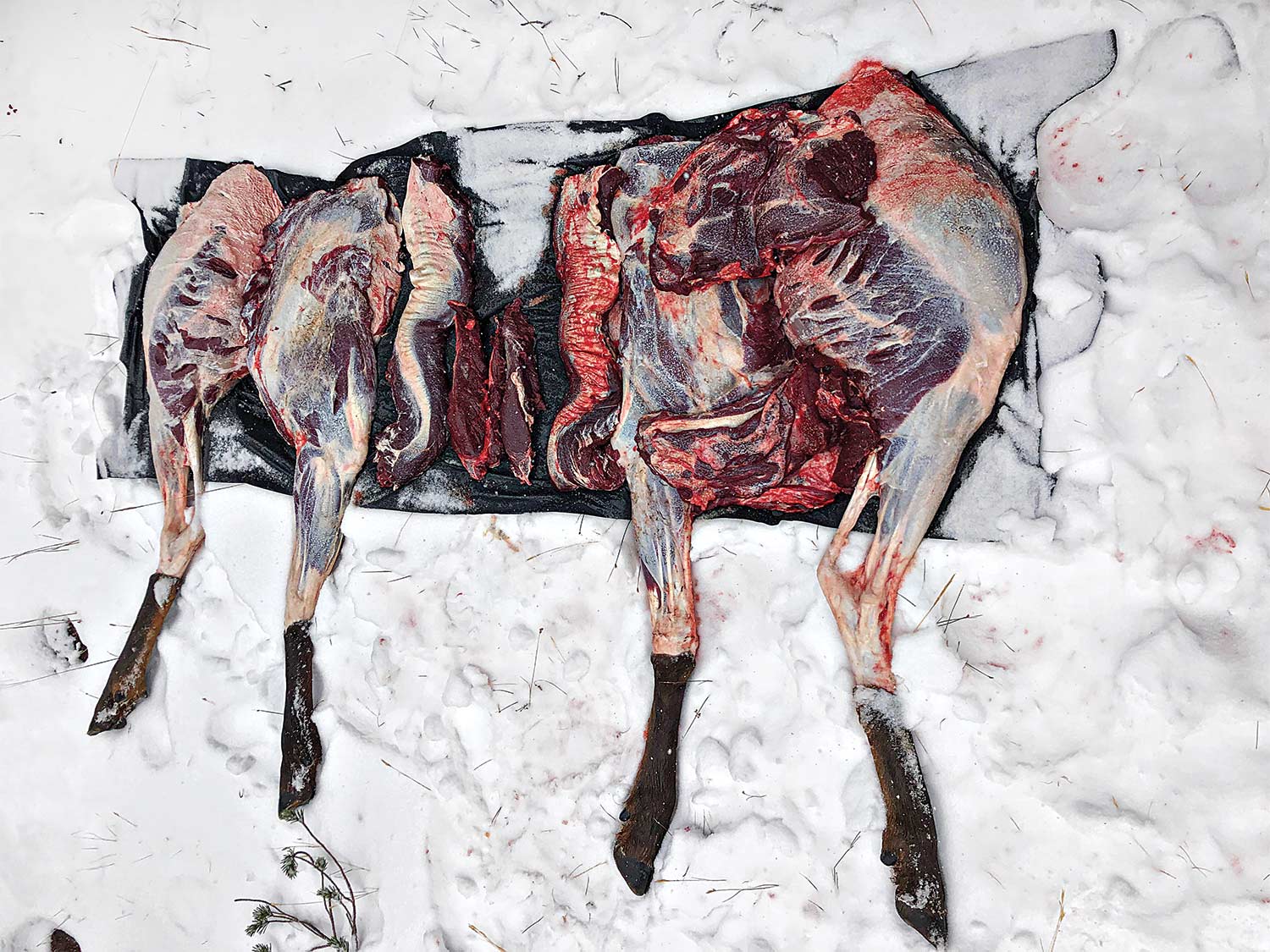
“Public Land, Private Place” by Natalie Krebs
That night I sleep as soundly as any hunter who has tagged out, and wake to find the tent empty and the cloud-covered sun well above the horizon. As I feed the horses and filter water, I wonder, not for the first time, why Aram invited me here. He enjoys helping other hunters—it’s partly why he used to work as a guide—but this excursion is no walk in the woods. He could have come alone, more easily and with better odds of success. He would not have wasted time teaching me to hobble a horse or call elk or lash saplings into a meat pole, nor worry about leading two friends to their own bulls.
The public-land perspectives in Aram’s home state might seem at odds with his own generous invitation to us non-residents. Utah has birthed some of the most anti-federal-land proposals in recent history. During the Sagebrush Rebellion of the 1970s, its legislators introduced a federal-land transfer bill that set the docket for the following decades. As recently as 2018, Rep. Mike Lee proposed bills that would transfer federal lands to the states and make it more difficult for the president to designate monuments. I know Aram disagrees with most of these sentiments. But he’s also fed up with country-wide opposition to downsizing Grand Staircase-Escalante National Monument, which lies in his backyard and has turned his pristine, lifelong hometown into a well-trafficked tourist destination. I can understand why residents would want to claim the incredible land they call home.
But I also understand why hunters who live east of here feel possessive of this wilderness. We own it too. We too have protected these lands with our votes and invested in their future with our taxes. But that’s only part of my connection to a place all Americans can claim. Romance for the West is still very much alive. Some lucky folks like Aram have carved out a piece of it. But a longing for open, untouched country remains among many who were born into crowded counties or work in cities where Rottweiler-size raccoons have replaced wild game and office buildings block the sky. The knowledge that I can hunt a place like this keeps me going when I’m stuck in traffic, and it revives me fully once I’m here. This particular place will always be Aram’s. Yet in a way, it belongs to me now too. I will never return without his permission. But neither will he return without remembering the bench where I killed my bull or the glade where we butchered his.
Read Next: 9 Hard Truths About Hunting on Public Land
When Aram and Serge trudge into camp, the horses fed and a fire crackling, they tell me about their morning hunt. That afternoon, Aram and I hike back to my elk and load all four quarters and the skull onto his young paint, Comanche. We are quiet as we pick our way down steep slopes and over beetle-killed pines, trying not to pressure the elk more than we already have. Yesterday we talked freely over Aram’s bull, discussing things you only divulge when drunk or in the wild. We were, perhaps, drunk on the hunt, giddy from killing an elk in spite of the odds. He had already shared the secret of this place. What were a few more secrets between friends?
As much as hunters value solitude, it’s hard to keep a perfect hunt in a perfect place to yourself. Aram’s mountain man had no reason to invite Aram into his own hunting grounds, but he shared them just the same. I could not have pulled this off without Aram; Aram didn’t need anyone to help him kill a bull. Yet without me or Serge to witness it, Aram’s spot exists only in his memory. He could tell the story of his hunt and show you photos, true. But to really know this place, to feel it? You have to have been here.
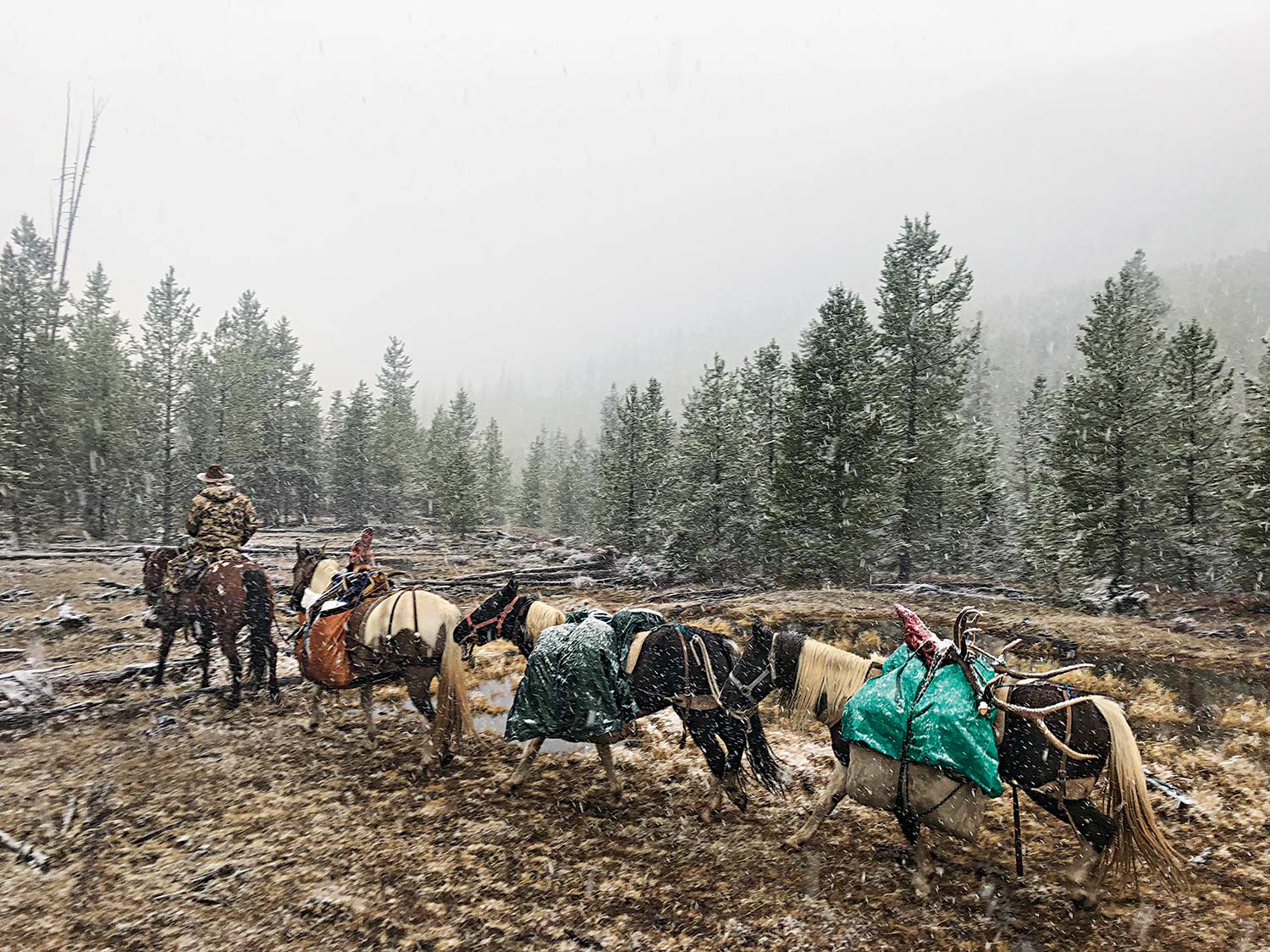
“Last, Not Least” by Aram von Benedikt
The storm continues to lash against the mountain—sometimes calm, blanketing snow over us like flour from a sifter, sometimes ripping through the pines, tearing our kitchen tarp from its moorings and forcing its way into everything living and dead. It is so cold that Natalie and I carve the meat early from half-frozen quarters, knowing they will soon become impossible to bone out. Serge keeps hunting, and I go with him most of the time, but all we find is one lonely cow. The elk have left, and it’s time to saddle our ponies and follow them down the mountain.
Serge is reluctant to end his first deep-country elk hunt. I have a trick up my sleeve, but he seems unconvinced when I tell him not to give up. We break our frozen camp in the first sunshine we’ve seen in days, saddle our horses, and load them with packs, elk meat, and antlers. It takes us the whole morning, but the sun holds and the trail beckons. We swing into our saddles and I remind Serge to keep his rifle handy, just as I keep my cow call slung about my neck. Every time we pass a timber-wrapped meadow, I stop the pack train, blow my call, and listen to the vast silence. Once, on the edge of a big flat, we bump a dozen elk, but there isn’t a bull among them. We cross the snow line and descend back into the golden aspens, where it feels like fall instead of winter. The day grows long, no bull answers, and I begin to fear Serge’s hunt really is over. One last meadow stands beside the trail, stretching several hundred yards through the canyon. I halt my horses, wait for them to settle, and blow my call. Nothing but silence answers, so I blow another plaintive chirp into the void. A slow, quavering bugle reaches us, followed by a single chuckle. I turn in my saddle, smirk at Serge, and step off my horse.
Natalie holds the pack train on the trail while Serge and I sidehill into the timber below. Cows feed on the meadow’s edge, but the bull is nowhere to be seen. As soon as Serge is behind his rifle, I call again, and the bull answers once more. He shows at the edge of the timber, dark antlers glistening in the damp. Serge shoots and the bull falls, struggles to his feet, and Serge shoots again. Then the bull is gone. We hurry to the spot, follow the spoor, and find Serge’s bull piled up in a hidden creek bottom. His elk is the biggest of the three.
The snow starts again as we load more quarters on the horses. The lazy snowflakes are bright against the dark timber, giving the scene an ethereal quality. Serge must walk again, this time with a skull strapped to his pack, and he falls behind as we hurry to get the horses to the trailhead before dark. There is more work yet ahead of us and a long, eye-drooping drive home. But none of that matters now. Our tags are all notched and the horses loaded to capacity. My wilderness is quiet, and the evening unspeakably beautiful as we ride into the night.
